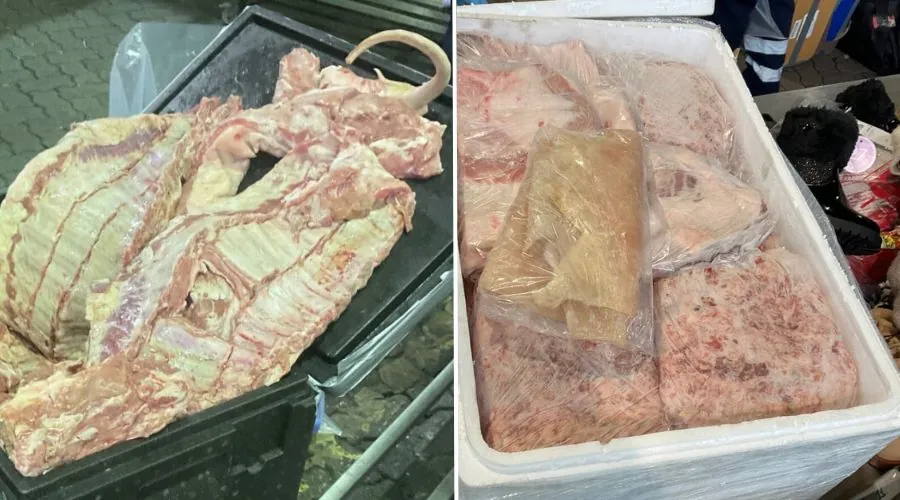Defra’s £3.1m boost is not enough to tackle illegal meat imports
9th April 2025
Defra has pledged to tackle illegal meat imports by offering £3.1 million in funding for checks at the Port of Dover in 2025/2026. However, the port authority said that this is not enough to protect the livestock sector from potentially devastating disease outbreaks.

The department has offered £3.1m for the financial year that just started, but this would provide just 20% operational coverage at Dover, broadly in line with the past year, and no operational coverage at Coquelles in France, the National Pig Association explained.
It also comes with caveats that would make any delivery ‘immensely challenging’, Lucy Manzano, DPHA head of port health and public protection, said. This includes no provision for official veterinarians, who play a key role in identifying products of animal origin.
“This would leave the border largely open. When DPHA are not operating, these checks do not take place,” she added.
READ MORE: Over six tonnes of illegal meat seized in Dover Port in one weekend
Over 214 tonnes of illegal meat seized
DPHA had submitted various funding proposals to Defra for 2025-26, including £6 million for about 50% coverage, but all have been ignored, Ms Manzano said.
She continued: “We have written to Baroness Hayman, Defra minister for biosecurity, advising of this, especially in the context of the escalating pressures we are experiencing at the border with the active creep of foot-and-mouth, African swine fever and Peste des petits ruminants (PPR) in Europe. We have requested an urgent review of the funding that has been offered.”
Ms Manzano has also repeatedly highlighted flaws in the government’s Border Target Operating Model (BTOM) for commercial import checks.
She recently told the Environment, Food and Rural Affairs Committee that since the implementation of the BTOM at Dover, illegal meat seizures have escalated as the UK’s weak border controls are being exploited, resulting in tonnes of illegal products being transported across the EU and into GB in vast quantities from countries like Romania, where imports are restricted due to ASF.
DPHA has now seized more than 214 tonnes of illegal meat at Dover since September 2022, and 55t since the start of this year, despite only operating at 20% capacity.
‘FMD could potentially cost £14.7 billion’
A coalition of pig sector and meat industry bodies, supported by NPA, has recently written to Defra secretary Steve Reed urging him to take immediate action to strengthen the UK’s national disease control measures.
With 90% of illegal imports arriving via Dover, the leaders wrote: ‘We believe the government must urgently invest in targeted enforcement at key ports of entry.’
NPA chief executive Lizzie Wilson explained it was vital that a sufficient resource is provided to enable Dover and other port authorities to intercept potentially infected meat.
She told the EFRA Committee in March that the relatively small resource being requested would pale into insignificance versus the cost of a notifiable disease outbreak, with ASF forecast to cost up to £100 million and FMD ‘potentially £14.7 billion’, based on the 2001 cost.
“If we do end up with another notifiable disease, government will be complicit, if they’ve not actually stopped the meat that they are entirely aware of is coming into this country,” she said.
In a letter to Baroness Hayman that also called for further clarity on Defra’s response to Germany’s FMD outbreak, EFRA chair Alistair Carmichael reiterated his call for Defra to ensure DPHA has ‘adequate funding’.
READ MORE: Campaigners call to tackle illegal bushmeat imports as they pose biosecurity threat
‘Pragmatic approach’
Commenting on the BTOM, Defra said it was taking a ‘pragmatic approach’ to phasing in EU import controls, which was ‘carefully calibrated to balance an expectation that businesses will do their best to comply whilst protecting biosecurity and minimising disruption to the flow of goods’.
It insisted TODCOF auto-clearance system is ‘a contingency measure that the public would expect a government digital service to have’, and is designed to support PHAs in their management of imports. TODCOF can be configured to ensure goods of greatest risk and concern are not auto-cleared, it added.
Defra confirmed that it had put a funding proposal to DPHA and said it ‘remained committed to agreeing on an appropriate funding model for 2025/26 to help tackle illegal imports’.
Read more livestock news.
